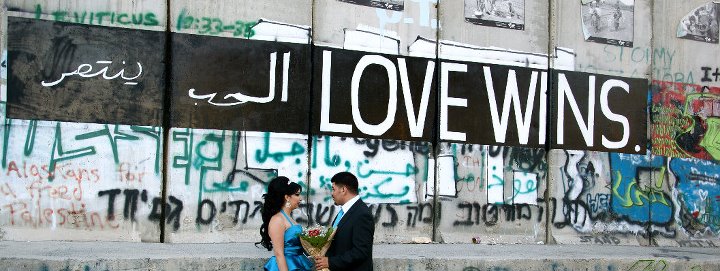
Love in the Shadow of the Wall

Love in the Shadow of the Wall

West Bank Palestinians encounter many complications if they marry someone from outside the West Bank. Whether the spouse is an Arab resident of East Jerusalem, an Israeli citizen, or a foreigner, he or she will encounter a good deal of stress in attempting to live in Palestine—not only due to political tensions, but also legal complexity and uncertainty.
Many people assume that the Palestinian/Israeli problem is between two states that have equal rights and power. But the reality is that the West Bank is under military occupation. It is Israel (not Palestine) that has full control over who is allowed to come and go from the West Bank. In Bethlehem, like many other places in Palestine, there are many brave couples are fighting to have a free and decent life.
Locals from the West Bank know that the excessive red-tape is deliberate strategy used to decrease the Palestinian population. If life is too difficult for a foreigner living with a Palestinian, both will typically leave — but not this courageous couple!
This is an interview with a WOP (“wives of Palestinians,” as they are affectionately referred to around here), whose husband is a native of Bethlehem and faculty member of Bethlehem Bible College. My friend, whose name must be withheld for security reasons, is a beautiful, intelligent, Hispanic woman whom I’m honored to call my friend.
Once Upon a Time in London
It was love from the first glance across the book shelf! Our heroes met in the library as international students at the same Christian college in London. They fell in love, got married in 2015 and moved to Palestine a few weeks later.
The Latina Ruth
When I asked her why they decided to live in Palestine, rather than her Latin-American country, she said, “Although my husband and I both had job opportunities in London, we felt it wasn’t God’s calling. My husband used to say, ‘If you marry me, you marry Palestine.’ So I married Palestine with him.”
With tear-filled eyes, she added, “My dad calls me the Latin Ruth because I followed Ruth’s footsteps when she came to Bethlehem. She swore to Naomi, ‘Your God is my God, and your people are my people.’”
The Circumstances
Was it easy to come to a conflicted area and start a new life? Of course, not. As a Palestinian, I know first-hand that only strong and brave souls deserve Palestine!
“I knew it was going to be difficult because of the conflict in Palestine, but I had no idea that the law was so unjust. The Palestinian Government has very little authority. While they recognize my marriage with my husband, they cannot do anything at the borders. Israel controls whether I get in or out. They have a law that in order to reapply for your Visa, you must leave the country every two years. I have a friend who was told by the officer at the border that her Visa did not give her permission to live with her husband, but rather only to visit him! I have never lived in a society where you do not know what’s going to happen.”
Unlike foreigners who marry Israeli Jews, there is no solid legal reference point to refer to for those who marry West Bank Palestinians. For example, if an Israeli Jew marries someone from another country, their spouse is immediately given privileges to live in Jerusalem or anywhere in Israel. They have laws that protect them, and they have the proper avenues in place to apply for and attain citizenship.
But there is no such thing as a spousal visa for West Bank Palestinians. Wives of Palestinians are only recognized under tourist, volunteer and student visas that must be constantly renewed. Every time a spouse applies to renew their visa, they must pay the Israeli government three hundred shekels, even though they never know how much time will be granted them. Sometimes they are given three or six months, other times they are given one year; and sometimes only ten days. This makes it very difficult to plan a life together in Palestine.
Coming in and out of Israeli-controlled borders also leaves foreign spouses at the discretion of whichever soldier, border patrol officer or customs agent they encounter. Foreign spouses never know what to expect, but like all Palestinians can only pray to encounter an Israeli official who is in a good mood.
Additionally, Israeli law dictates that spouses of Palestinians are not allowed to work in Palestine. And more often than not, they are confined to the West Bank. With a few exceptions, they are not allowed to enter Israel. Neither are they allowed to visit other countries without losing their hard-earned Visas. When you add these factors to the tensions that everyone already faces living here, it is easy to see why many such married couples end up abandoning Palestine for somewhere else. Usually it is the foreign wife who cannot bear her new status as a second-class person.
“When a foreigner marries a Palestinian, she has nothing. There is no website where I can go and see what I need to apply for residency or citizenship. There is no category in the world for wives of Palestinians.”
How could anybody willingly accept this kind of life?
Our Latina Ruth has her own answer: “We are okay with uncertainty because we live by faith and not by sight. But in my case, it was especially hard for me to come, because I knew if I came, I may not be able to leave. I love traveling, and I used to travel a lot.”
Cross-Cultural Challenges
On adjusting to a new culture, she commented: “It’s not easy to marry a Palestinian and to live here under the occupation. I often think of a book called ‘Love in the Time of Cholera ‘by Gabriel Garcia Marquez. My love story with my husband might be called, ‘Love in the Shadow of the Wall.’”
She even considered not coming with her husband. “But then my dad said, ‘Well, you need to be like Jesus in Bethlehem. He left all the privileges He had in heaven, and He embodied Himself as a true human being.’ He told me that I should follow Jesus in the same way. If that means losing my travel privileges so that I can do what our Savior did, that is the best way I can embody Jesus.”
For this reason, she never travels through Ben Gurion Airport in Tel Aviv. (Palestinians are not allowed to fly out of Ben Gurion, which is only an hour from Bethlehem, but are required to travel through Amman, Jordan. This inconvenient and expensive commute can take an entire travel day passing through the Palestinian/Israeli/Jordanian border).
“My husband and I decided that we would take the same journey together and I would not go through Israel. It is not the way of Jesus to take more privilege, simply because I am a foreigner.”
Hope in Conflict
Despite these challenges, they intend raise their family in Palestine: a land of conflict that is still filled with hope and life. They want their children to grow up in a place where they will have an awareness of injustice and struggle.
“We don’t want to just have an easy life for our kids; I think that you form better human beings in struggles. The struggle here only makes us more determined to stay.
“For us, staying is resistance. We don’t believe in violence; we believe in non-violent resistance. And I think that just by the fact that we are staying–no matter how difficult Israel makes it for us–we are victorious! We are having our children here, and we are going to have a happy life here.”
“We believe that God will make a way. There is something so beautiful in keeping the population of Christians in Bethlehem not only alive, but thriving! To be a part of that is so important for us.”
Please keep this couple and others like them in your prayers, along with the small Christian community in Palestine and Israel.
Amira is the Communications Coordinator of Bethlehem Bible College. She is a committed Palestinian Christian who has a passion for writing about the intersection of faith and seeking justice for her fellow countrymen. To read more of her writings sign up for Bethlehem Bible College’s monthly newsletter.

